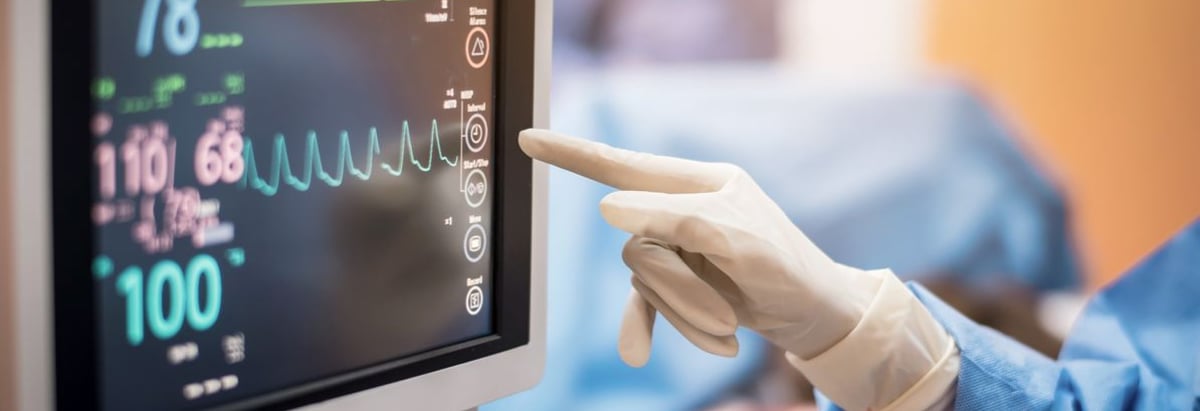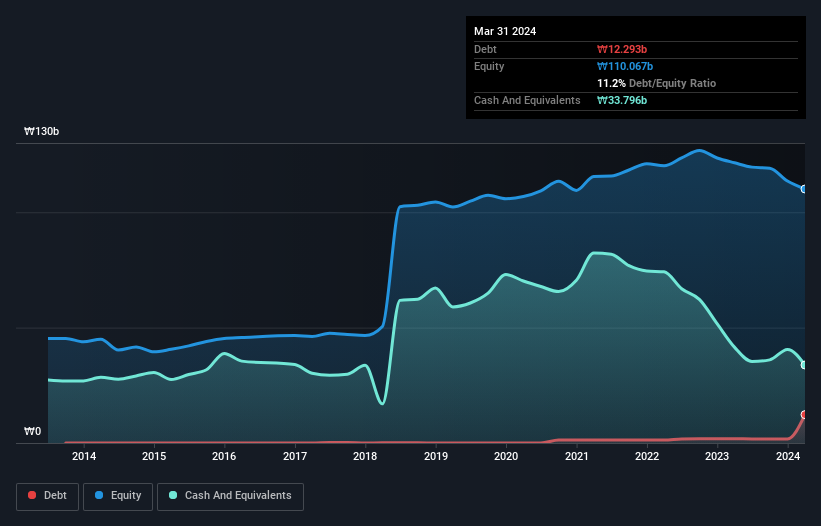- South Korea
- /
- Healthtech
- /
- KOSDAQ:A032620
These 4 Measures Indicate That UBcare (KOSDAQ:032620) Is Using Debt Reasonably Well

Some say volatility, rather than debt, is the best way to think about risk as an investor, but Warren Buffett famously said that 'Volatility is far from synonymous with risk.' So it seems the smart money knows that debt - which is usually involved in bankruptcies - is a very important factor, when you assess how risky a company is. As with many other companies UBcare. Co., Ltd. (KOSDAQ:032620) makes use of debt. But the real question is whether this debt is making the company risky.
When Is Debt A Problem?
Debt and other liabilities become risky for a business when it cannot easily fulfill those obligations, either with free cash flow or by raising capital at an attractive price. In the worst case scenario, a company can go bankrupt if it cannot pay its creditors. However, a more frequent (but still costly) occurrence is where a company must issue shares at bargain-basement prices, permanently diluting shareholders, just to shore up its balance sheet. Of course, debt can be an important tool in businesses, particularly capital heavy businesses. The first thing to do when considering how much debt a business uses is to look at its cash and debt together.
View our latest analysis for UBcare
What Is UBcare's Net Debt?
As you can see below, at the end of March 2024, UBcare had ₩12.3b of debt, up from ₩1.85b a year ago. Click the image for more detail. But on the other hand it also has ₩33.8b in cash, leading to a ₩21.5b net cash position.

A Look At UBcare's Liabilities
The latest balance sheet data shows that UBcare had liabilities of ₩38.9b due within a year, and liabilities of ₩19.1b falling due after that. On the other hand, it had cash of ₩33.8b and ₩20.4b worth of receivables due within a year. So it has liabilities totalling ₩3.80b more than its cash and near-term receivables, combined.
Having regard to UBcare's size, it seems that its liquid assets are well balanced with its total liabilities. So it's very unlikely that the ₩247.6b company is short on cash, but still worth keeping an eye on the balance sheet. Despite its noteworthy liabilities, UBcare boasts net cash, so it's fair to say it does not have a heavy debt load!
The modesty of its debt load may become crucial for UBcare if management cannot prevent a repeat of the 75% cut to EBIT over the last year. When it comes to paying off debt, falling earnings are no more useful than sugary sodas are for your health. When analysing debt levels, the balance sheet is the obvious place to start. But you can't view debt in total isolation; since UBcare will need earnings to service that debt. So if you're keen to discover more about its earnings, it might be worth checking out this graph of its long term earnings trend.
Finally, while the tax-man may adore accounting profits, lenders only accept cold hard cash. While UBcare has net cash on its balance sheet, it's still worth taking a look at its ability to convert earnings before interest and tax (EBIT) to free cash flow, to help us understand how quickly it is building (or eroding) that cash balance. Looking at the most recent three years, UBcare recorded free cash flow of 42% of its EBIT, which is weaker than we'd expect. That's not great, when it comes to paying down debt.
Summing Up
We could understand if investors are concerned about UBcare's liabilities, but we can be reassured by the fact it has has net cash of ₩21.5b. So we don't have any problem with UBcare's use of debt. There's no doubt that we learn most about debt from the balance sheet. However, not all investment risk resides within the balance sheet - far from it. These risks can be hard to spot. Every company has them, and we've spotted 2 warning signs for UBcare you should know about.
If you're interested in investing in businesses that can grow profits without the burden of debt, then check out this free list of growing businesses that have net cash on the balance sheet.
New: AI Stock Screener & Alerts
Our new AI Stock Screener scans the market every day to uncover opportunities.
• Dividend Powerhouses (3%+ Yield)
• Undervalued Small Caps with Insider Buying
• High growth Tech and AI Companies
Or build your own from over 50 metrics.
Have feedback on this article? Concerned about the content? Get in touch with us directly. Alternatively, email editorial-team (at) simplywallst.com.
This article by Simply Wall St is general in nature. We provide commentary based on historical data and analyst forecasts only using an unbiased methodology and our articles are not intended to be financial advice. It does not constitute a recommendation to buy or sell any stock, and does not take account of your objectives, or your financial situation. We aim to bring you long-term focused analysis driven by fundamental data. Note that our analysis may not factor in the latest price-sensitive company announcements or qualitative material. Simply Wall St has no position in any stocks mentioned.
About KOSDAQ:A032620
UBcare
Provides electronic medical record solutions for hospitals, clinics, and pharmacies in South Korea and the United States.
Excellent balance sheet and good value.
Market Insights
Community Narratives



